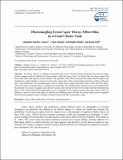Files in this item
Disentangling great apes’ decoy-effect bias in a food choice task
Item metadata
| dc.contributor.author | Sánchez-Amaro, Alejandro | |
| dc.contributor.author | Altinok, Nazli | |
| dc.contributor.author | Heintz, Christophe | |
| dc.contributor.author | Call, Josep | |
| dc.date.accessioned | 2019-08-06T08:30:02Z | |
| dc.date.available | 2019-08-06T08:30:02Z | |
| dc.date.issued | 2019-08-01 | |
| dc.identifier | 259651502 | |
| dc.identifier | bbc03d00-8246-4095-ad60-6b5ee9008237 | |
| dc.identifier.citation | Sánchez-Amaro , A , Altinok , N , Heintz , C & Call , J 2019 , ' Disentangling great apes’ decoy-effect bias in a food choice task ' , Animal Behavior and Cognition , vol. 6 , no. 3 , pp. 213-222 . https://doi.org/10.26451/abc.06.03.05.2019 | en |
| dc.identifier.issn | 2372-5052 | |
| dc.identifier.other | ORCID: /0000-0002-8597-8336/work/60427630 | |
| dc.identifier.uri | https://hdl.handle.net/10023/18254 | |
| dc.description | The project was supported by an ERCSynergy grant SOMICS (grant number 609819). | en |
| dc.description.abstract | The decoy effect is a violation of rationality that occurs when the relative preference between two target options changes with the addition of a third option, called the decoy, that is no better than the target options but worse than one of the options on one attribute. The presence of the decoy increases the chance that the option that dominates it on this attribute is chosen over the other target option. The current study tested decoy effects with great apes’ food preferences. We presented apes with two target items, grape and banana, and a third item, the decoy, which was either a smaller grape or a smaller piece of banana. We found that apes’ decisions were not influenced by the presence of a decoy. In general, apes did not increase their choices in favor of the target item that dominated the decoy. This would indicate that great apes are not vulnerable to the cognitive biases that cause decoy effects in humans, at least in cases where choice is between two different types of food. We discuss what can be concluded about the psychological causes of human irrational choices and their evolutionary origin. | |
| dc.format.extent | 10 | |
| dc.format.extent | 452994 | |
| dc.language.iso | eng | |
| dc.relation.ispartof | Animal Behavior and Cognition | en |
| dc.subject | Decoy-effect | en |
| dc.subject | Rationality | en |
| dc.subject | Great apes | en |
| dc.subject | Food preferences | en |
| dc.subject | BF Psychology | en |
| dc.subject | DAS | en |
| dc.subject.lcc | BF | en |
| dc.title | Disentangling great apes’ decoy-effect bias in a food choice task | en |
| dc.type | Journal article | en |
| dc.contributor.sponsor | European Research Council | en |
| dc.contributor.institution | University of St Andrews. Centre for Social Learning & Cognitive Evolution | en |
| dc.contributor.institution | University of St Andrews. School of Psychology and Neuroscience | en |
| dc.identifier.doi | https://doi.org/10.26451/abc.06.03.05.2019 | |
| dc.description.status | Peer reviewed | en |
| dc.identifier.grantnumber | 609819 | en |
This item appears in the following Collection(s)
Items in the St Andrews Research Repository are protected by copyright, with all rights reserved, unless otherwise indicated.

